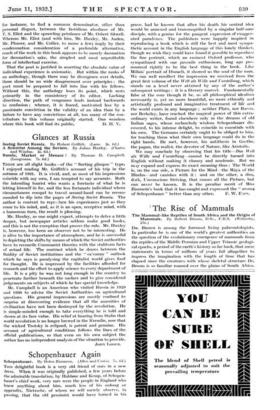Schopenhauer Again
Schopenhauer. By Helen Zimmern. (Allen and tinwin. 7s. 6.1.) Tins delightful book is a very old friend of ours in a new dress. When it was originally published, a few years before. the admirable translation, by Haldane and Kemp, of Schopen- hauer's chief work, very rare were the people in England who knew anything about him, much less of his anhong or appendix, Nietzsche, of Whom we will merely observe, in passing, that the old pessimist would have turned in hit grave, had he known that after his death his central idea would be annexed and transmogrified by a singular half-sane disciple, with a genius for the pungent expression of exagger- ated paradoxes. The publishers were happily inspired in reproducing a book which is still the best and most sympa- thetic account in the English language of this lonely thinker, though we wish they could have found it possible to reproduce the fine portrait, which an eminent Oxford professor, who sympathized with our juvenile enthusiasm, long ago pro- nounced rightly to be the best thing in the book. Like Millais' portrait of Disraeli, it showed us the soul of the man.. We can well recollect the impression we received from the great first volume of the Welt als Wide und l'orstellung, which stands on a level never attained by any of the author's subsequent writings : it is a literary marvel. Fundamentally- false at the core though it be, as all philosophical idealism necessarily is, yet no more beautiful, no more ethically and artistically profound and imaginative treatment of life and the world exists in any language ; neither Plato, nor Bacon, nor Berkeley, have reached the magical power of this extra- ordinary writer, found elsewhere only in the dreams of old Indian sages, whose melancholy wisdom Sehopenhauer dis- covered, to his intense delight, to coincide in essentials with his own. The Germans certainly ought to be obliged to him, for teaching them what their own language could do in the right hands. He met, however, Ids antithesis in Goethe, the pagan, the realist, the devotee of Nature, like Aristotle.
We may conclude by observing that his title—Das !Felt a's Wile and Vorstelluttg—cannot be directly turned into English without making it clumsy and academic. But we miy expand and express its exact meaning thus : The World is, on the one side, a Picture for the Mind—the Idllyà of the Hindus—and vanishes with it : and on the other, a dim, dark, Unconscious Striving, that causes all the Picture, but can never be known. It is the peculiar merit of Miss Zimmcm's book that it has caught and expressed the " aroma'
of Schopenhauer " better than any other. F. \V. PAIN.


































 Previous page
Previous page